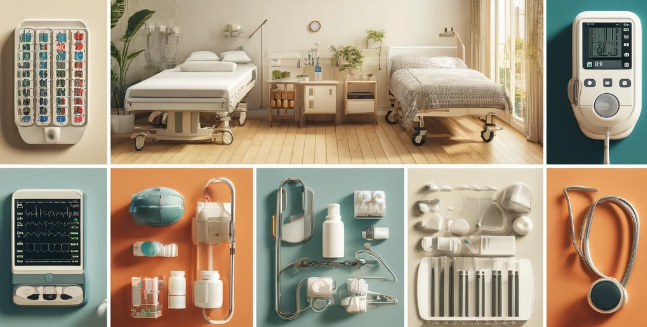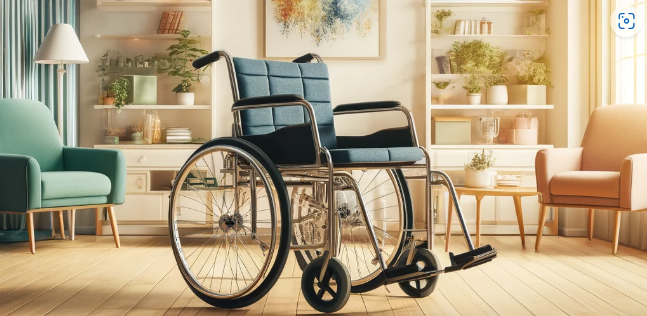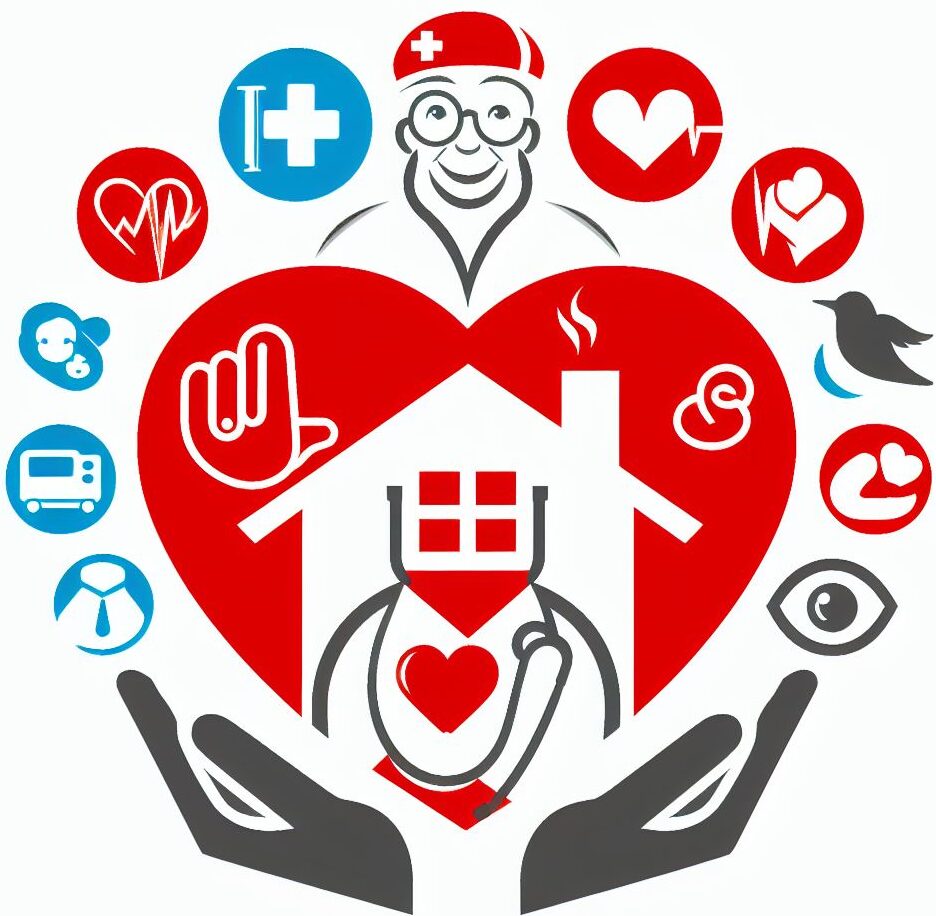“Medical Supplies for Elderly Home Care | A Comprehensive Guide” highlights the necessity to adapt the living environment to accommodate their changing needs.
Whether they’re dealing with mobility issues, chronic conditions, or simply require extra support, having the right medical supplies can significantly enhance their quality of life. From basic necessities to larger equipment, here’s a comprehensive guide to essential medical supplies for elderly home care, covering different stages of care.
(As an AvaCare Medical affiliate marketer, I earn a commission on qualified purchases at no additional cost to the purchaser.)

Understanding Individual Needs of the Elderly
Let’s start by emphasizing the importance of customizing medical supplies to the individual needs of seniors at home. Not every elderly person requires the same level of care, and pinpointing exactly what each individual needs is crucial. This approach not only maximizes comfort but also ensures dignity and fosters a sense of independence.
Each phase may demand different types of supplies in the various stages of elderly care at home. From early self-sufficient stages to more dependent scenarios, understanding this progression helps in being prepared for any changes that come with aging.
Appropriate medical supplies do more than just aid in daily functions. They’re a key component in safeguarding the safety and promoting the autonomy of our loved ones. When the environment is adapted to their needs with the right tools, the risk of injuries can be drastically reduced, and their overall well-being can be significantly improved.
Therefore, choose something that resonates with the needs of your elderly loved one. Whether it’s something to assist with mobility, to help with medication management, or to make the bathroom safer, each item plays a part in creating a supportive home care system.
There are daily living aids and comfort items that are foundational to a nurturing and safe home environment for the elderly. From simple utensils that make mealtime less of a challenge to sophisticated mobility devices. This range gives you a solid understanding of what your toolkit for elderly home care should contain.
The Fundamentals | Daily Living Aids and Comfort Items
When it comes to elderly care at home, ensuring day-to-day comfort is essential. Daily living aids are designed to assist with routine activities, making them a foundational element of home care.
Mobility is often a concern for the elderly, so items like walkers, canes, and wheelchairs can be indispensable. These aids provide support and stability, helping prevent falls and other accidents. Moreover, it’s crucial to choose the right type of device based on the individual’s mobility level and environment.
Let’s talk about bathroom safety. It’s one of the most hazardous areas in the home for seniors. Installing grab bars, using shower seats, and laying down anti-slip mats are simple modifications that can significantly reduce the risk of slips and falls.
Your loved ones also deserve to feel comfortable in their living space. This is why pressure-relieving mattresses, ergonomically designed pillows, and adaptive clothing should be part of the mix. They not only contribute to a pleasant environment but can also help prevent bedsores and improve overall comfort.
Remember, choose items that resonate with the senior’s personal requirements. While there are standard products available, the key is to adapt these selections to fit individual preferences and medical needs.
Advanced Equipment for Comprehensive Home Care
When you’re managing elderly care at home, certain situations may require specialized medical equipment that goes beyond the basics. These tools can drastically improve quality of life and aid in more serious health conditions. Here is a highlight of some of the critical pieces of advanced equipment you might need.
First up are medical alert systems and monitoring devices. These systems can be lifesavers, literally. They help ensure that in an emergency, help is just a button press away. Whether it’s a wearable device or a home-based system, the peace of mind that comes with quick access to assistance cannot be overstated.
Furthermore, breathing easy isn’t something everyone can take for granted. For those with respiratory conditions, having the right aids like nebulizers, oxygen concentrators, or CPAP machines at home can make all the difference. They can not only alleviate symptoms but also prevent hospital visits by providing essential respiratory support in the comfort of your own home.
Nutrition is a crucial aspect of care, and some individuals may struggle with traditional eating. In these cases, feeding pumps and specialized dietary supplements can help ensure that your loved one receives the necessary nutrients to maintain their health and energy levels.
As you consider these advanced equipment options, always remember to consult with healthcare professionals to determine the best fit for your situation. Up next, we’ll look at how to effectively manage healthcare at home, including keeping track of medications and coordinating with care providers.
Navigating Healthcare Management at Home
First, let’s recognize the vital role of effective healthcare management for elderly individuals receiving care at home. Just don’t worry too much about keeping track of every little detail on your own. There are tools to help you manage medications and monitor health conditions.
Medication management systems, like pill organizers and automatic reminders, can prevent missed doses and double dosing. There are tools and strategies for organizing medications, ensuring your loved ones take the right pills at the right time.
For those managing chronic conditions, regular monitoring can make all the difference. Tools such as glucose meters for diabetes and blood pressure monitors for hypertension allow for routine checks to maintain optimal health.
You can always adjust your approach down the road, but starting with a strong coordination strategy with healthcare providers is crucial. Additionally, establishing a clear line of communication ensures timely updates on health status and any necessary adjustments in care protocols.
Remember, you’re not in this alone. Leverage support from community resources, healthcare professionals, and family to maintain a high quality of home care. Your first attempt at managing home healthcare doesn’t need to be your last. It’s important to stay flexible and adapt as your situation changes.
Let’s look at a general guideline for basic supplies to advanced equipment below.
General Guidelines | Basic Supplies
Mobility Aids:
- Canes: Provide stability while walking.
- Walkers: Offer more support and stability than canes.
- Rollators: Feature wheels and brakes for easier movement.
- Crutches: Assist with weight-bearing mobility.
- Mobility Scooters: Ideal for outdoor use and longer distances.
Bathroom Safety Equipment:
- Grab Bars: Installed in bathrooms for stability and support.
- Shower Chairs/Benches: Allow seniors to sit while bathing.
- Raised Toilet Seats: Make it easier to sit and stand.
- Non-Slip Mats: Prevent slips and falls in the bathroom.
Daily Living Aids:
- Reacher Grabbers: Assist in reaching items without bending or stretching.
- Adaptive Clothing: Clothing with Velcro or magnetic closures for easier dressing.
- Pill Organizers: Help seniors manage their medication regimen.
- Hearing Amplifiers: Enhance hearing for those with mild to moderate hearing loss.
Intermediate Supplies
Bedroom Equipment:
- Bed Rails: Prevent falls and provide support while getting in and out of bed.
- Overbed Tables: Allow seniors to eat, read, or work comfortably from bed.
- Pressure Relief Mattresses: Help prevent bedsores for seniors who are bedridden.
Wound Care Supplies:
- Bandages and Gauze: Essential for dressing wounds and cuts.
- Antiseptic Solution: Clean wounds to prevent infection.
- Medical Tape: Secure bandages and dressings in place.
- Disposable Gloves: Protect caregivers from exposure to bodily fluids.
Nutritional Support:
- Nutritional Supplements: Ensure seniors receive adequate nutrition.
- Feeding Tubes and Accessories: Necessary for seniors who have difficulty swallowing.
Advanced Equipment
Wheelchairs and Accessories:
- Manual Wheelchairs: Allow for independent or assisted mobility.
- Power Wheelchairs: Ideal for seniors with limited upper body strength.
- Wheelchair Ramps: Provide accessibility to homes and vehicles.
- Wheelchair Cushions: Prevent pressure sores and enhance comfort.
Hospital Beds and Accessories:
- Electric Hospital Beds: Offer adjustable height and positioning for comfort.
- Bedside Commodes: Serve as a toilet when bathroom access is limited.
- Bed Alarms: Alert caregivers if a senior attempts to leave the bed unsupervised.
- Overhead Lift Systems: Assist with transferring seniors from bed to wheelchair.
Respiratory Support:
- Oxygen Concentrators: Provide supplemental oxygen for seniors with respiratory conditions.
- CPAP/BiPAP Machines: Treat sleep apnea and improve sleep quality.
- Nebulizers: Administer medication for respiratory conditions such as asthma or COPD.

Conclusion | Medical Supplies for Elderly Home Care
Ensuring the comfort, safety, and well-being of elderly loved ones requires careful consideration of their unique needs. By investing in the appropriate medical supplies and equipment, caregivers can create a supportive environment that promotes independence and enhances quality of life.
From basic aids to advanced technology, there’s a wide range of resources available to facilitate elderly home care at every stage of the aging process.
I hope “Medical Supplies for Elderly Home Care | A Comprehensive Guide” has provided beneficial information for you or someone caring for a loved one.
Please feel free to share your thoughts, questions, or comments below. I’d love to hear from you and will be happy to respond.
(As an AvaCare Medical affiliate marketer, I earn a commission on qualified purchases at no additional cost to the purchaser.)
Veron | Entrepreneur | The Way 4WordEnterprises
Personal Recommended Resources:
Another Daughter TM | A senior care service for independent Seniors living in or around Raleigh, NC

Appreciate this post. Let me try it out.
Thank you for your feedback!